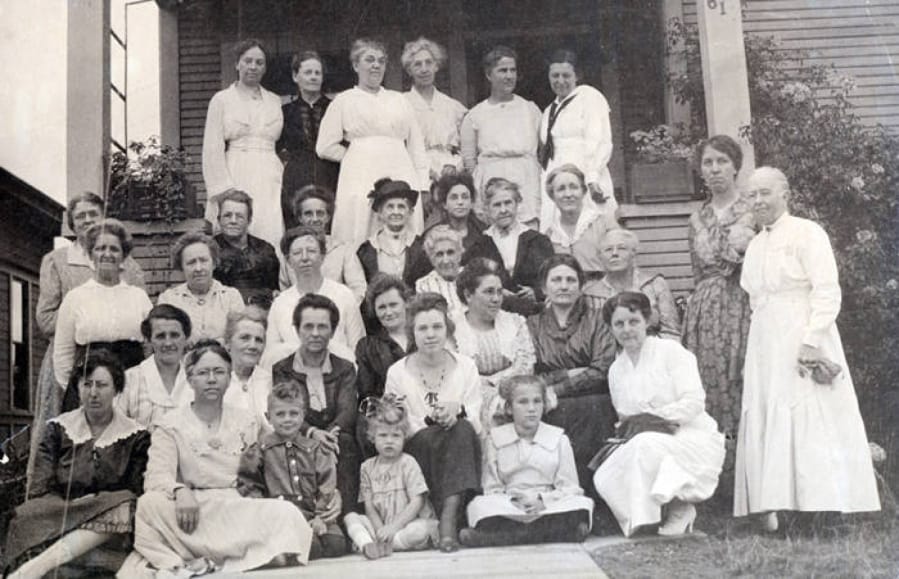Imagine having your most basic citizenship right, the right to vote, enshrined in law, then legally revoked. Then granted again, then yanked away again.
You’d get pretty fired up to end the dithering and cement that right once and for all, wouldn’t you?
That’s what Vancouver and Washington women did in the late 1800s and early 1900s, according to independent historian Shanna Stevenson. Based in Olympia and longtime coordinator of the Washington State Historical Society’s Women’s History Consortium project, Stevenson is the featured speaker in tonight’s online History on Tap event.
Ticket sales will end at 6 p.m. sharp for the 7 p.m. online program, which is co-hosted by the Clark County Historical Museum and Kiggins Theatre. Kiggins is where the event would have taken place, before a live and drinking audience, if not for the coronavirus pandemic.
If You Stream
What: History on Tap presents “Washington Women Win the Vote,” featuring independent historian Shanna Stevenson.
When: 7 p.m. today. Tickets must be purchased before 6 p.m. At 6:30 p.m. you will receive email with a private link to the event.
Price: $10.
Website: https://www.kigginstheatre.com/movies/history-on-tap/
The streaming program will include all the usual features in a regular History on Tap outing, including “Ask Pat,” wherein historian Pat Jollota expounds upon a community member’s question, and a local trivia contest. Trivia contestants this time will be members of the League of Women Voters.
After that, Stevenson will describe the promising advances, maddening retreats and political smarts of Washington women working to secure the right to vote more than a century ago. It’s nearly forgotten now that the right was established, then withdrawn from women twice in the 1880s before being made permanent in Washington state in 1910, she said.
And that’s still a full decade before women’s suffrage was made the law of the land, in August 1920.
Clever messaging
Why did states like Washington lead the way to women’s suffrage? The profound challenges of life in the West generated a more modern, realistic attitude toward women who worked just as hard as their husbands to settle the frontier, raise families and maintain households, Stevenson said. Women stepping beyond their traditional roles drove the push for voting rights across the West.
Not that it was ever smooth sailing. After those two occasions in the 1880s when the established right got revoked, Stevenson said, Washington women took their activism, grit and cleverness about political messaging to a whole new level.
“I think it created a lot of resolve,” she said. “There was a long period of hard work and advocacy, and Vancouver was one of the centers of that grassroots effort.”
Mary Hayden (a leader in the Clarke County Equal Suffrage Association), Margaret Heyes Hall (student of politics, debater and class president at the University of Washington) and M. Ella Whipple (doctor, superintendent of schools and Christian temperance activist) are three Vancouver suffragists you’ll learn about if you log into Stevenson’s lecture.
“Women formed suffrage clubs and they were very motivated,” Stevenson said. “That was a strength of the effort in Washington, it was not a top-down effort. It came up from local communities.”
Their challenge was convincing men. Local women felt they had strong arguments in that proven history of hardy pioneering and also in their natural “municipal housekeeping” role, Stevenson said. They were eager to vote their support for civic and public-health improvements for children and families like schools, parks and food-and-drug laws. Not having that right was tantamount to taxation without representation, they said.
“Women were already equal partners in society, in economics, in the home and the community,” Stevenson said. “What they had to do was tailor their message to be politically successful.”
Some suffragists took pains to avoid additional controversy by keeping their cause separate from the overlapping anti-alcohol temperance movement, she said. The Washington Equal Suffrage Association published “Votes for Women, Good Things to Eat: The Washington Women’s Cook Book,” which cleverly aimed to spread the word and raise funds for the cause while also reassuring husbands that their enfranchised wives would keep cooking for them.
“That’s my favorite tactic,” Stevenson said.
Today, Stevenson is mindful of a new movement afoot to demand truly equal rights in America.
“It was a long time until all women and all people gained voting rights,” she said. “We can learn from what they went through. We’re commemorating this anniversary, but it was a long way to go and in some ways we are still working toward equality for all.”




